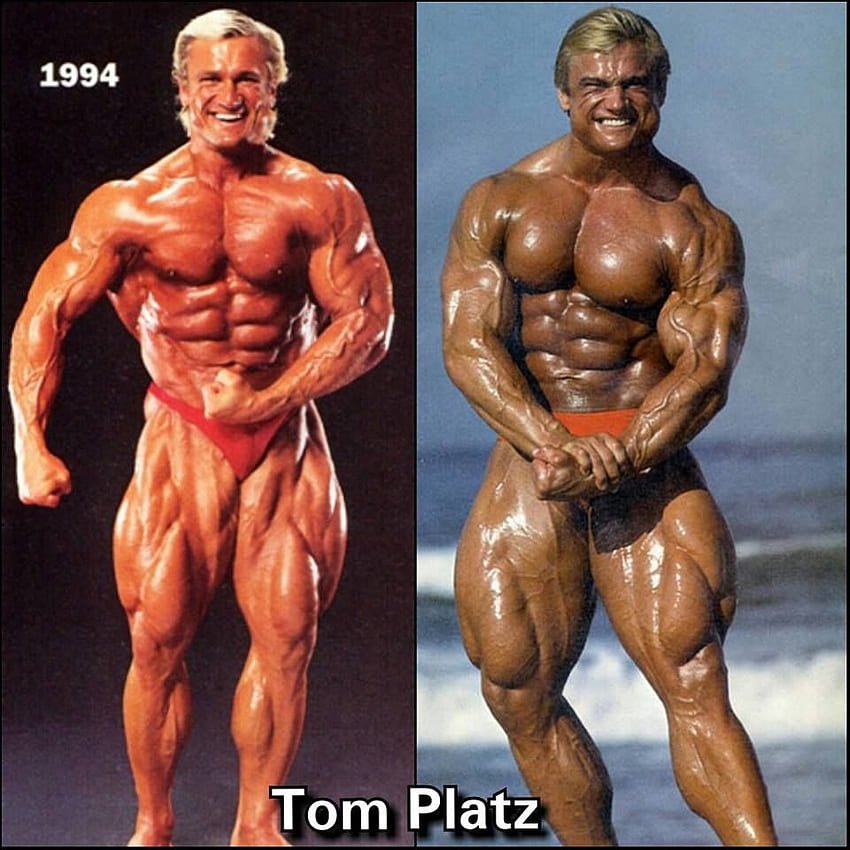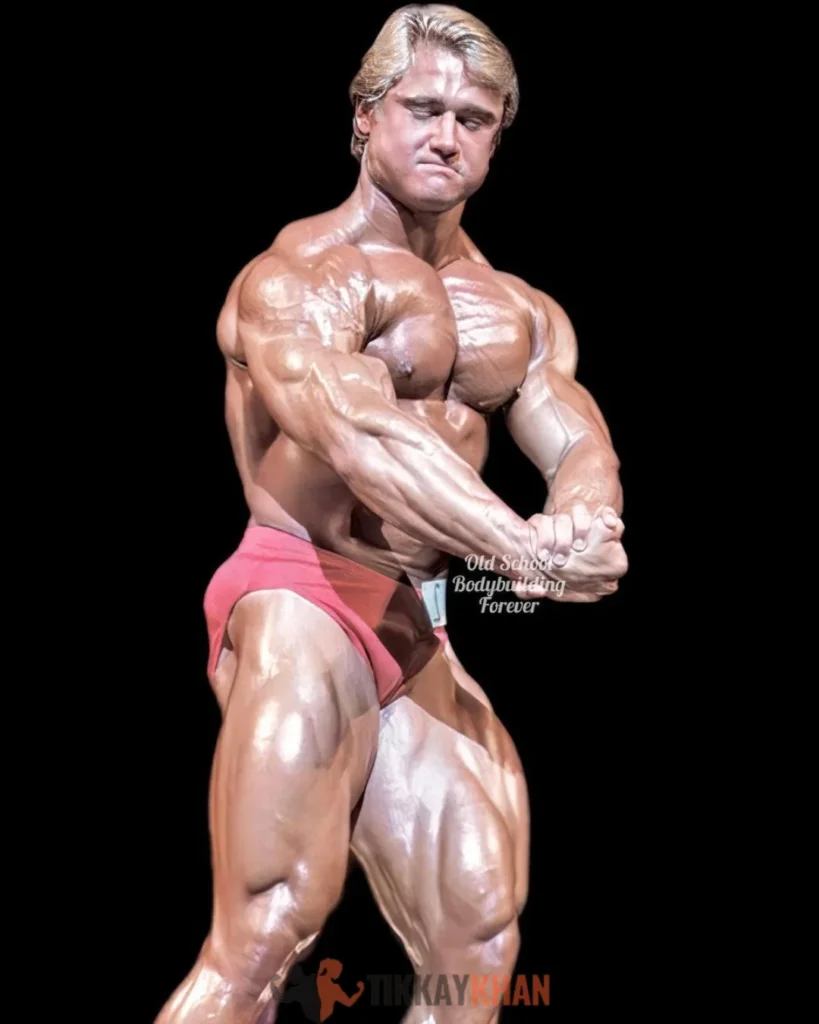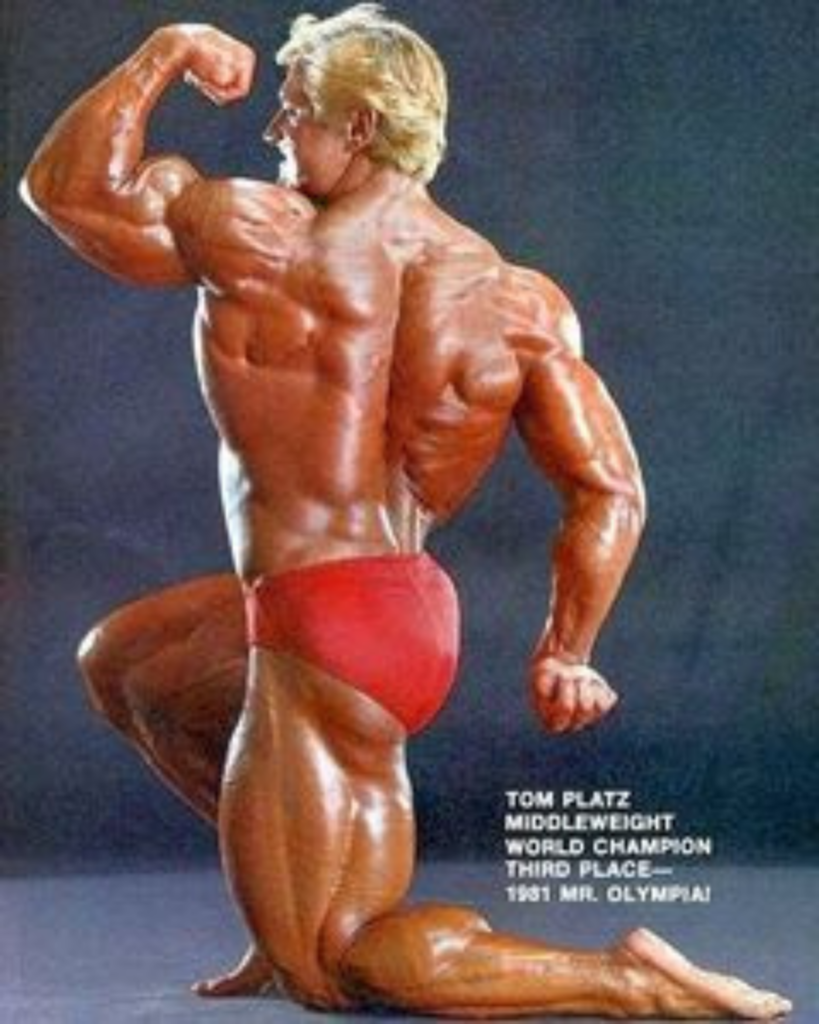Tom Platz, a name synonymous with the golden era of bodybuilding, has recently made headlines with his candid critique of the modern state of the sport.
Known as the ‘Quadfather’ for his legendary leg development, Platz has long been revered not only for his physique but also for his deep understanding and love of bodybuilding.
However, in a recent Instagram reel shared on August 1, 2024, Tom Platz expressed his growing concern that bodybuilding has strayed far from its roots, evolving into what he calls a “science experiment” driven by excessive drug use.

The Golden Era vs. Modern Bodybuilding: A Stark Contrast
Tom Platz competed during what many consider the golden age of bodybuilding, a time when the sport celebrated aesthetic physiques, symmetry, and the art of posing.
Tom Platz himself was a prime example of this era’s ideals, boasting unmatched muscle hardness and conditioning, which he achieved through grueling training methods and a disciplined approach to nutrition and supplementation.
Despite finishing as high as third in the 1981 Mr. Olympia, Tom Platz’s legacy transcends competitive placements.
He was known for his intensity and work ethic, often pushing his peers, including Arnold Schwarzenegger, to their limits in the gym.
His philosophy was simple: train hard, respect the process, and let the results speak for themselves.
In stark contrast, Tom Platz now views modern bodybuilding as a sport increasingly dominated by science rather than art.
He has become vocal about the pervasive use of performance-enhancing drugs (PEDs) across all divisions, including categories like Bikini and Figure, which were traditionally seen as more natural and less extreme.
Related: Bodybuilder Tom Platz Flaunts Shredded Quads from 1988 to 2024 on 69th Birthday
The Evolution of PED Use: From Simplicity to Excess
Tom Platz’s criticism of the current state of bodybuilding centers around the rampant and often reckless use of PEDs.
Reflecting on his own experience with these substances, Tom Platz revealed that he kept his drug use simple and ‘uncomplicated.’
He believes that the modern era has taken a different approach, with athletes relying heavily on complex and excessive drug regimens to achieve their physiques.
“When I took a lot of stuff, I tried androgenic material. I looked like modern day,” Platz shared, recalling his own experimentation with PEDs. “I gained a lot of weight. I looked like I was blocky, trying to waddle onto the stage, and I said, never again.” T
AdvertisementContinue Reading Below
his experience led Tom Platz to reject the idea that more drugs equal better results, a sentiment that he feels is lost on today’s competitors.
Tom Platz is particularly critical of the fact that even athletes in the less muscular categories, such as Bikini and Figure, are resorting to steroids at levels that he finds alarming.
“Right now we have science experiments on stage in every category,” Platz stated. “The Bikini girls are taking more anabolic steroids than I did back in my heyday.”
AdvertisementContinue Reading Below
This, he argues, is a sign that bodybuilding has lost its way, with athletes and coaches prioritizing quick fixes over the art of building a physique through hard work and discipline.
Related: Tom Platz Bodybuilder: The Quadfather’s Legacy Unveiled
The Dangerous Mindset of Modern Bodybuilding
One of the most troubling aspects of modern bodybuilding, according to Tom Platz, is the mindset that has developed around drug use. He notes that many athletes now view genetics as an excuse to use more drugs, rather than a challenge to overcome through hard work.

“What I hate to see today was, well, I don’t have enough genetics, so it means more drugs. Well, I have great genetics, and I’ll take even more drugs and be the superstar of all time,” Platz lamented.
This mentality, Tom Platz believes, is leading the sport down a dangerous path. While he acknowledges that bodybuilding has always involved some level of drug use, he feels that the current levels are “absurd” and are contributing to a growing number of health issues and even deaths within the community.
“It wasn’t about abusing myself. I can barter with God for one more show,” Platz said, expressing his concern for the wellbeing of today’s athletes. “I think it’s at an absurd level right now. Oh, I get it. I know why it works, but it’s also not the healthiest way to do it, and it concerns me about the people dying.”
AdvertisementContinue Reading Below
A Call for a Return to the Art of Bodybuilding
Despite his criticism, Tom Platz does not view bodybuilding as a “dark sport.” On the contrary, he speaks fondly of his time in the industry, describing it as a “mentally, physically, spiritually, and financially satisfying” career.

For Platz, bodybuilding was always about the love of the sport, the joy of pushing his limits, and the satisfaction of seeing his hard work pay off on stage.
“I liked being involved with something I love. I love this dearly. It was never about the money,” Platz emphasized.
AdvertisementContinue Reading Below
However, Platz is adamant that the sport needs to return to its roots, focusing less on science and more on the art of bodybuilding.
He believes that this shift is necessary not only to preserve the health of the athletes but also to maintain the integrity of the sport.
“I think we need less science, more art,” Tom Platz stated, calling for a change in the way bodybuilding is approached at all levels.
Echoes of Concern from Other Legends
Tom Platz is not alone in his concerns. Other bodybuilding legends, such as Rich Gaspari and Shawn Ray, have also spoken out about the excessive use of PEDs in modern bodybuilding.

Gaspari, in particular, has criticized the rampant steroid use in the Bikini and Wellness categories, attributing it to poor coaching and a lack of knowledge among trainers.
“There are too many trainers out there that don’t know what they’re doing,” Gaspari remarked, echoing Tom Platz’s sentiments about the dangers of relying too heavily on drugs.
Shawn Ray has also weighed in on the issue, pointing out that today’s bodybuilders often overcompensate with too much food and PEDs, resulting in physiques that are less aesthetically pleasing and more prone to health issues.
Ray argues that while no one is forcing athletes to use steroids, the culture of modern bodybuilding makes it difficult to compete without them, leading to an environment where risks are taken for the sake of short-term gains.
Related: Tom Platz: The Quadfather’s Indelible Mark on Squatting Power
Conclusion: The Future of Bodybuilding
Tom Platz’s call for change in modern bodybuilding is a timely and important reminder of the values that once defined the sport.
While bodybuilding has always involved a combination of art and science, Tom Platz believes that the balance has shifted too far towards the latter, to the detriment of the athletes and the sport as a whole.
His plea for a return to the art of bodybuilding, where hard work, discipline, and dedication take precedence over shortcuts and quick fixes, is one that resonates with many who share his love for the sport.
As the bodybuilding community continues to grapple with the issue of PED use, the voices of legends like Tom Platz, Rich Gaspari, and Shawn Ray serve as a crucial reminder of the dangers of losing sight of what truly matters.
Whether the sport will heed their warnings and make the necessary changes remains to be seen, but one thing is clear: the conversation has begun, and the future of bodybuilding may well depend on how it evolves in response to these concerns.